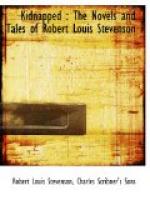“Well, sir,” said I, after I had thought the matter out in silence, “I’ll stay awhile. It’s more just I should be helped by my own blood than strangers; and if we don’t agree, I’ll do my best it shall be through no fault of mine.”
CHAPTER IV
I RUN A GREAT DANGER IN THE HOUSE OF SHAWS
For a day that was begun so ill, the day passed fairly well. We had the porridge cold again at noon, and hot porridge at night; porridge and small beer was my uncle’s diet. He spoke but little, and that in the same way as before, shooting a question at me after a long silence; and when I sought to lead him to talk about my future, slipped out of it again. In a room next door to the kitchen, where he suffered me to go, I found a great number of books, both Latin and English, in which I took great pleasure all the afternoon. Indeed, the time passed so lightly in this good company, that I began to be almost reconciled to my residence at Shaws; and nothing but the sight of my uncle, and his eyes playing hide and seek with mine, revived the force of my distrust.
One thing I discovered, which put me in some doubt. This was an entry on the fly-leaf of a chap-book (one of Patrick Walker’s) plainly written by my father’s hand and thus conceived: “To my brother Ebenezer on his fifth birthday” Now, what puzzled me was this: That, as my father was of course the younger brother, he must either have made some strange error, or he must have written, before he was yet five, an excellent, clear manly hand of writing.
I tried to get this out of my head; but though I took down many interesting authors, old and new, history, poetry, and story-book, this notion of my father’s hand of writing stuck to me; and when at length I went back into the kitchen, and sat down once more to porridge and small beer, the first thing I said to Uncle Ebenezer was to ask him if my father had not been very quick at his book.
“Alexander? No him!” was the reply. “I was far quicker mysel’; I was a clever chappie when I was young. Why, I could read as soon as he could.”
This puzzled me yet more; and a thought coming into my head, I asked if he and my father had been twins.
He jumped upon his stool, and the horn spoon fell out of his hand upon the floor. “What gars ye ask that?” he said, and he caught me by the breast of the jacket, and looked this time straight into my eyes: his own were little and light, and bright like a bird’s, blinking and winking strangely.
“What do you mean?” I asked, very calmly, for I was far stronger than he, and not easily frightened. “Take your hand from my jacket. This is no way to behave.”
My uncle seemed to make a great effort upon himself. “Dod man, David,” he said, “ye should-nae speak to me about your father. That’s where the mistake is.” He sat awhile and shook, blinking in his plate: “He was all the brother that ever I had,” he added, but with no heart in his voice; and then he caught up his spoon and fell to supper again, but still shaking.




